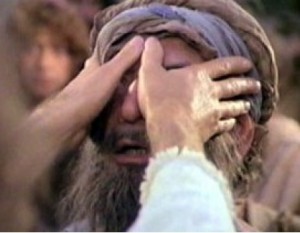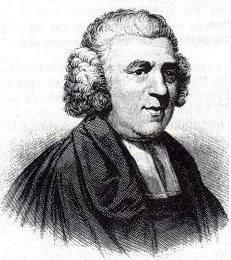“Amazing grace! How sweet the sound
That saved a wretch like me.
I once was lost, but now am found,
Was blind but now I see.”
 |
Jesus cures the man born blind
How often we are blind – not literally, like the man born blind, who we find in St. John’s Gospel (Chapter 9) – but blind to the goodness of God, and all that he represents, then, now, always. We are blinded by our passions, by our culture, by our self-centred desires, by conforming to, (copying if you like), the ways-of-life of people around us. John Newton wrote this autobiographical hymn, in 1773, as a clergyman, after leading a life as a young man that was utterly opposed to God, and his ways. He describes the change that occurred within his own self, as a cure of blindness. Indeed, that is what it was, and no exaggeration was ever intended.
It is that ‘cure’ that arouses my interest. We may ask the question: “How many people need a cure in their lives?” I suppose more or less everyone if they are self-aware at all, and honest. Then, we might ask “How are people cured?” The answer is that there are probably as many ways to be ‘cured’ as there are people, but in all, and overall, we are talking about sinfulness – major and minor – sinful ways to turn away from God. Human considerations, unfortunately, often fail to recognise the seriousness of sin: we might say: “Oh it cannot be helped; it is really not his, or her, fault because of the pressures they are under; that is why they behave in this way, or that”. We may say that a person’s actions have their root-cause founded in his, or her, genes and this means they are not really culpable. We may put the cause down to their background: “They didn’t have a chance in life, and so it is understandable that such people turn to what is sinful and evil.” We may get used to sin through the laws and economic systems we tolerate – through our inertia and lack of commitment to a cause. We have a world in which those who are very poor, (something like 80% of the world population), have almost nothing; many are at food starvation levels, with inadequate water supplies and no recourse to medication, while those of us who live in the wealthier, well-developed countries, have more than we need. Can it be right to sit back and say: “I’m all right, Jack”, and ignore the plight of those who would eat the scraps from Lazarus’ table. There are millions of ‘street children’ who are doing just that. Furthermore, we acquiesce in laws that make it legal, easily, to break away from the bonds of marriage, to call marriage something that it is not, or allow, all-to-easily, people to terminate pregnancies.
All this leads to countless injustices, deaths, suffering and untold confusion in peoples’ hearts. In the present world situation – including that of our own country – there are crimes that cry to God for vengeance. What about the sufferings and deaths in the Middle East, in the Ivory Coast, in Japan, to name but a few disaster areas in our world. We remain helpless, though able to pray, for those involved in the sad situations of today’s world. And prayer means things are never ‘quite as bad as they are painted’; we should never doubt the power of prayer! I have prayed, for years, for peace between India and Pakistan, and it seems the World Cup Cricket semi-final played its part. God has his own ways and means and, I suspect, a well-developed sense of humour.
Unless rejected, sin inevitably leads to untold misery – and ruin. I take for an example, the statement made to me very recently, to the effect that such-and-such a person should be told to stop behaving so badly, as what they are doing, will ruin their family. Yet, we are ensnared by our own desire for excitement, in a boring home situation, or, we are greedy for this, or that, pleasure, ‘pleasure’ leading to addictions, and further personal, and family, misery. Sadly, the low point of such tendencies – when all can become meaningless and empty – is for people, in our culture, to commit suicide. It happens far too frequently; I wonder if those who have taken such drastic measures can imagine the suffering this causes, to those who belong to – and love – those who die in this way.
 |
John Newton
The way out of all this, is in the autobiographical hymn of John Newton; the ‘Amazing Grace’ of God, i.e. his life and love and presence. Jesus said “I am the Resurrection”. He is not a vengeful God, always asking us to ‘cow-tow’ to his laws, but a friend who walks closely, by our side, if we will let him. Daily, we can pray, without any self-consciousness or awkwardness – perhaps, with a bit of practice – together with others who are our friends, and who are willing to do the same, for the difficult challenges of each day – challenges that may concern me, directly, or my family. Jesus is the Resurrection; that is the solution to every situation, including the final darkness, and emptiness, that is death. He is not a set of rules to be followed, but a living friend, whom we can meet in prayer, in the Word of God, in the sacraments, and above all with our friends; and, He has the solution for us.
“Amazing grace! How sweet the sound
That saved a wretch like me.
I once was lost, but now am found,
Was blind but now I see.”
(Unfortunately, in sending out this blog by e-mail, ‘Word Press’ distorts the originalformatting of the document. Readers are, therefore, advised to visit the website: www.stmarysblog.co.uk should they wish to read it in its intended format).
